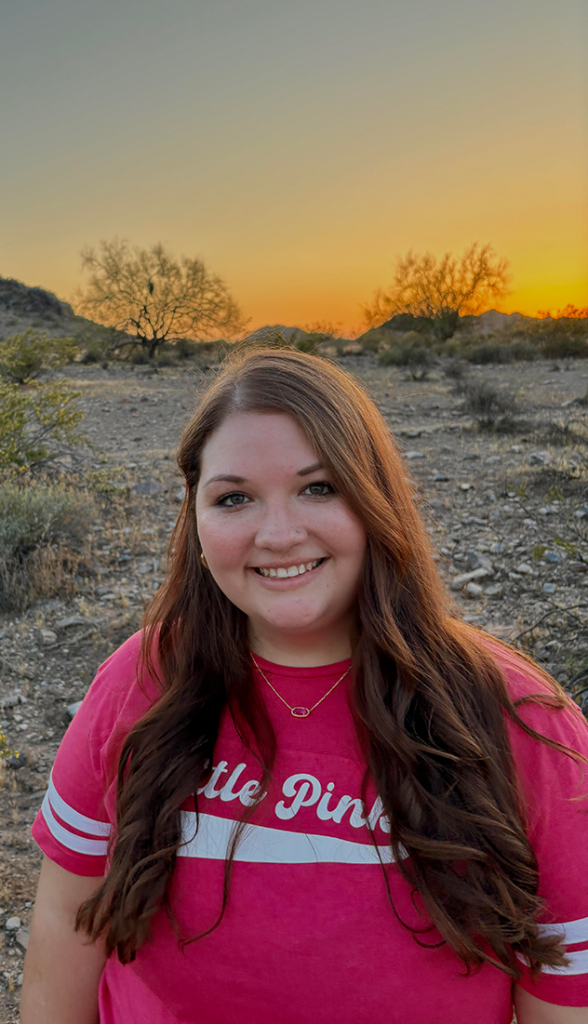A year ago, if you were to have asked Rebecca Bohn what she most appreciated in her life, her answer likely would have been different than it is today. Now, things some people consider insignificant are much higher on her list.
“I’m just so thankful for the littlest things that are actually the biggest things,” says Rebecca. “Like being able to walk on my own, talk on my own and eat on my own. The very little things, like being able to brush my own hair and teeth, do things with my friends and family, or take my dogs for a walk. You kind of take those things for granted.”
Life-threatening breathing issues — and more importantly, the treatment she received for them at St. Elizabeth Healthcare — gave Rebecca, then 27, a new viewpoint.
Respiration at Risk
Rebecca’s treatment included extracorporeal membrane oxygenation (ECMO). It’s a form of advanced life support for people with severe lung failure, heart failure or both.
When you’re healthy, you breathe in oxygen from the air and your lungs help move it into your bloodstream. From there, the oxygen travels throughout your body. Your lungs also help you expel carbon dioxide from your body when you exhale. This exchange of oxygen and carbon dioxide is respiration.
Respiration is essential to life. But Rebecca was experiencing respiratory failure. Oxygen and carbon dioxide weren’t being exchanged effectively, and her body was getting only about half the oxygen it needed. ECMO took over her lungs’ work, giving them time to heal.
A Case of Double Pneumonia
For several days prior to Thanksgiving in 2024, Rebecca had been at home fighting a fever and feeling lethargic. But when her breathing became difficult and she had chest pain, she told her husband she’d better go to an urgent care center.
Following a chest X-ray, the urgent care provider directed her to St. Elizabeth Florence Hospital Emergency Department. The hospital immediately admitted her and began treating her for double pneumonia.
“We were thinking that I would just get some fluids and antibiotics and, in a day or two, everything would clear up,” Rebecca said.
Unfortunately, that didn’t happen. Rebecca’s care team decided she needed more help.
Healing Comes with Time
From that point, things got fuzzy for Rebecca. The care team sedated her and transferred her by ambulance to St. Elizabeth Edgewood Hospital. There, within 20 minutes, she was on a ventilator and an ECMO machine in the intensive care unit.
St. Elizabeth monitors patients throughout the health system. If it looks like someone could benefit from ECMO, they work to provide it quickly.
“We try to make room for them and get them here right away,” says George Christensen, DO, ECMO Program Medical Director. In the future, St. Elizabeth hopes to create a mobile ECMO team that can transfer patients from other regional hospitals, too.
In Rebecca’s case, doctors initiated venovenous (VV) ECMO. It involves surgically placing thin plastic tubes called cannulas into two veins. The ECMO machine draws blood out of one cannula, oxygenates it outside the body and removes carbon dioxide. The machine then returns the oxygenated blood through another vein.
Rebecca remained on ECMO for five days. During that time, doctors identified the bacteria causing her pneumonia and started her on antibiotics to effectively attack the bug. ECMO helped her get the oxygen she needed until her lungs were healthy enough to do the job themselves.
The Right Team, The Right Place
In total, Rebecca was in the hospital for about two weeks. The experience was challenging mentally and physically. It’s hard to describe what you feel when you can’t catch your breath, she says. And even when she began improving, nothing came easily.
“The first day I was able to get out of bed, I walked six steps,” she says. “It was the hardest thing I’ve ever done in my life.”
With physical therapy, she steadily improved and got back to doing everyday tasks like eating and caring for herself. She’s quick to credit the ECMO team with her recovery.
“My care was exceptional,” she says. Doctors, nurses, respiratory, physical and speech therapists, social workers and chaplains all played a part.
It started with ECMO Coordinator Caroline Lindemann, RRT, accompanying her from Florence. And it continued throughout her hospital stay. Even when she was off ECMO, team members continued to check on her. Rebecca won’t soon forget what they did for her medically or their kindness.
“I would just say thank you a million times over to them,” she says. “I’m thankful that I trusted St. Elizabeth with my care and that’s where I was when I needed help most.”
Medical advancements in heart care mean better outcomes for patients. To learn more about the heart and vascular services offered at St. Elizabeth, visit our website.

